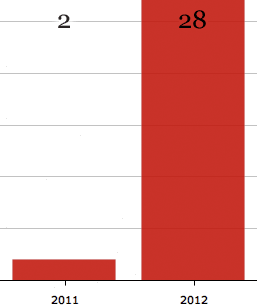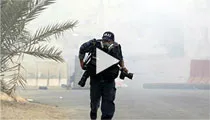A new constitution with restrictive press provisions was approved in late year amid heavy opposition criticism and reports of ballot fraud. CPJ and others criticized articles creating a new government press regulator and establishing new state authority to shut media outlets. The new charter also did nothing to halt the criminal prosecution of journalists, a hallmark of the Hosni Mubarak regime. A reporter covering a rally protesting the new constitution was killed in December when he was struck by a rubber bullet that witnesses said was fired by a Muslim Brotherhood supporter. Several other journalists said they were assaulted while covering similar demonstrations. Other serious violations were reported throughout the year, including a sexual assault and a number of other physical attacks against journalists. Before the election of President Mohamed Morsi in June, the interim-ruling Supreme Council for the Armed Forces carried out a series of Mubarak-era tactics intended to stifle media critical of the military. The tactics included the use of politicized trials and interrogations to intimidate reporters, along with the temporary detention of journalists, two of whom were brutalized in custody. The Shura Council, controlled by the Freedom and Justice Party, took a firm grasp of state media in August, appointing political allies as heads of the institutions. Several journalists working for state newspapers reported that critical articles were being pulled. Although Morsi banned pre-trial detention of journalists, the press remained at legal risk. At least six journalists faced charges of “insulting the president” or “insulting Islam.” By late 2012, the prosecutor general was pursuing a series of investigations into independent Egyptian newspapers on accusations of insulting the president or reporting false news.
Egypt
» Restrictive constitution adopted; journalist killed covering protest rally.
» Government appoints heads of state media, exerting control over coverage.
A new constitution with restrictive press provisions was approved in late year amid heavy opposition criticism and reports of ballot fraud. CPJ and others criticized articles creating a new government press regulator and establishing new state authority to shut media outlets. The new charter also did nothing to halt the criminal prosecution of journalists, a hallmark of the Hosni Mubarak regime. A reporter covering a rally protesting the new constitution was killed in December when he was struck by a rubber bullet that witnesses said was fired by a Muslim Brotherhood supporter. Several other journalists said they were assaulted while covering similar demonstrations. Other serious violations were reported throughout the year, including a sexual assault and a number of other physical attacks against journalists. Before the election of President Mohamed Morsi in June, the interim-ruling Supreme Council for the Armed Forces carried out a series of Mubarak-era tactics intended to stifle media critical of the military. The tactics included the use of politicized trials and interrogations to intimidate reporters, along with the temporary detention of journalists, two of whom were brutalized in custody. The Shura Council, controlled by the Freedom and Justice Party, took a firm grasp of state media in August, appointing political allies as heads of the institutions. Several journalists working for state newspapers reported that critical articles were being pulled. Although Morsi banned pre-trial detention of journalists, the press remained at legal risk. At least six journalists faced charges of “insulting the president” or “insulting Islam.” By late 2012, the prosecutor general was pursuing a series of investigations into independent Egyptian newspapers on accusations of insulting the president or reporting false news.
Newspaper reporter Al-Hosseiny Abou Deif died after being struck by a rubber bullet fired by a person whom witnesses identified as a Muslim Brotherhood supporter. Regionwide, fatalities soared in Syria but dropped in most other nations.
Bahrain |  |
Egypt |  |
Iran |  |
Iraq |  |
Israel and the Occupied Palestinian Territory |  |
Libya |  |
Syria |  |
Tunisia |  |
Yemen |  |
Assaults, harassment, and detention of journalists occurred regularly throughout 2012, but attacks reached a peak during a three-day period in May when protesters clashed with uniformed military personnel and plainclothes agents in front of the Defense Ministry in Cairo. The demonstrations initially protested the exclusion of a would-be presidential candidate. One journalist had part of his ear cut off, and several others were hospitalized with serious injuries.
| 11 | Beaten or assaulted |
| 1 | Camera confiscated |
| 13 | Arrested |
In August, the upper house of parliament, known as the Shura Council, appointed new heads of state-run media. Journalists were outraged by the move and saw it as a way for the Muslim Brotherhood's ruling Freedom and Justice Party to exercise control over news coverage. The Shura Council also announced new requirements for the positions, including a rule that candidates must be under 60 years of age.
Record
Must have no criminal record.Experience
Must have served at least 15 years at the outlet at which they are applying. Must have spent the last 10 years working at the same institution.Language skills
Must be proficient in Arabic and have conversational proficiency in a foreign language.Egypt has the highest number of Facebook users in the region, according to Facebook statistics. Social media has played an increasingly greater role as a reporting and information-gathering tool for journalists, particularly in the face of censorship for critical writing.

